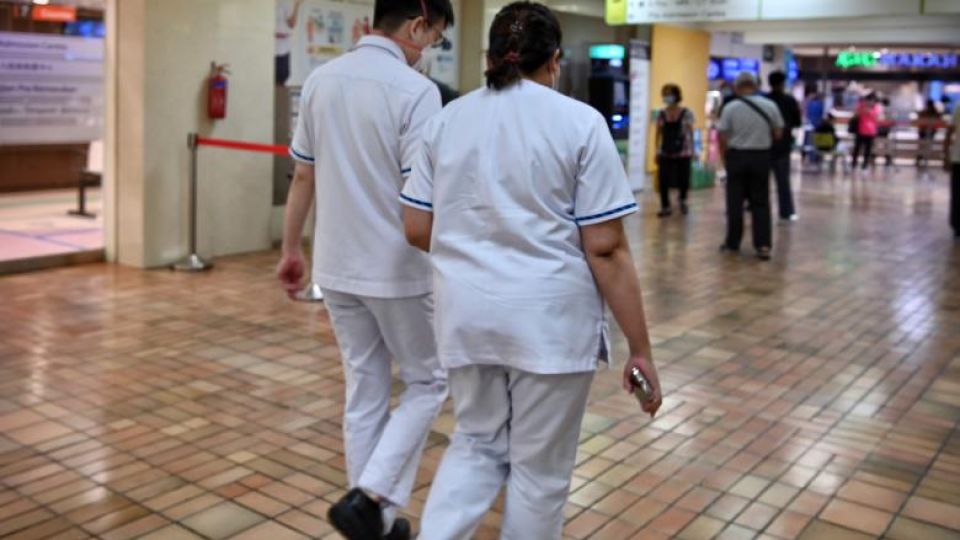January 10, 2022
SINGAPORE – Healthcare institutions, already facing a manpower shortage, are on standby to activate staff volunteers and other support staff should the Omicron Covid-19 variant spark a wave of severe cases.
The Government has warned that an Omicron wave is imminent. While the latest variant is believed to cause a milder disease than the Delta variant, the hospitals here are closely monitoring the situation.
The National Healthcare Group (NHG) for one has been tapping administration staff who are cross-trained to support manpower on the front lines.
Where appropriate, its healthcare institutions also leverage SG Healthcare Corps, a medical reserve force that the Government set up in 2020 to gather volunteers to fight the coronavirus, as well as part-time staff to augment manpower needs, said NHG’s group chief human resource officer Olivia Tay.
The National University Health System (NUHS) is prepared to convert existing hospital wards for Covid-19 patients if needed, and has staff volunteers on standby to support its front-line staff should there be another surge in cases, a spokesman said.
Such staff volunteers had helped with basic tasks such as serving meals, clearing food trays and keeping watch on patients with a high risk of falls in the fourth quarter of last year, after Covid-19 hospitalisations here went through the roof from around late September to November. These staff volunteers are no longer deployed at the wards, the spokesman said.
Manpower shortages continue to be a major issue at healthcare institutions impacted by the Great Resignation – the 2021 global phenomenon describing the mass exodus of workers – which left the organisations with no choice but to find new ways to cope.
In November last year, Senior Minister of State for Health Janil Puthucheary informed Parliament that about 1,500 healthcare workers had resigned in the first half of 2021, compared with about 2,000 annually pre-pandemic.
That number for the first six months of 2021 included nearly 500 foreign doctors and nurses.
Staffing shortages at many healthcare institutions around the world have led to burnout, driving many workers to quit their jobs.
At NHG, attrition across the cluster and of its nurses in the first year of the pandemic was manageable, said Mrs Tay, who added: “However, 2021 saw an increase in attrition rates which were higher than the pre-Covid periods.”
To augment manpower, the group is working with MOH Holdings (MOHH) to expand and diversify its recruitment options, she said.
“We have also been actively offering structured career programmes to displaced workers from other sectors.”
Last year was challenging, as the Delta variant’s arrival in April created a new wave of cases.
With many countries facing rising Covid-19 cases in the hospitals, the demand for healthcare workers has remained high. Hiring is challenging.
“There is a higher demand for healthcare workers than what the market can supply. Overseas recruitment is also challenging due to uncertainty caused by stringent border measures,” said Mrs Tay.
“We are in need of all types of healthcare workers, from medical to ancillary staff. Our greatest challenge at this juncture is attracting more healthcare assistants and patient service associates to public healthcare,” she added, referring to roles that help lessen the load of nurses.
“We have leveraged on job redesign and conversion programmes to attract job seekers, (especially) Singaporeans and permanent residents. This tight labour situation is not expected to improve until Singapore transits from a pandemic to an endemic stage, where the workload is more predictable and manageable,” said Mrs Tay.
NUHS is looking to fill administration and support positions, as well as nursing vacancies.
Its group chief human resource officer Priscilla Teo said the healthcare cluster has been participating in many career fairs or talks to support its recruitment needs.
“We share and publicise our job or sponsorship opportunities regularly with students and alumni of the various schools and tertiary institutions. For example, there will be open houses this month by Alexandra Hospital, Ng Teng Fong General Hospital and National University Hospital to recruit multiple healthcare roles,” she said.
“We also continue to leverage on job advertisements, open house, career fairs/talks, Career Conversion and Return to Nursing programmes.”
NUHS is also banking on staff referrals, collaborating with targeted associations and recruitment agencies to attract career switchers, and offering more scholarships, sponsorships and industrial attachment opportunities.
At SingHealth, Singapore’s largest healthcare cluster, recruitment and retention of healthcare professionals have become a lot more challenging in this pandemic, said its group chief human resource officer Esther Tan.
“In addition to our direct hiring efforts both locally and internationally for healthcare professionals, we continue to leverage existing initiatives such as bringing in mid-career joiners under the professional conversion programmes for healthcare professionals and attracting non-practising nurses to rejoin the workforce,” she said.
Much of SingHealth’s retention efforts focus on supporting staff in their professional growth and development, said Ms Tan.
“We have also stepped up on our efforts to appreciate our staff and ensure that they are well cared for, and provide them with the resources and support to manage stress and prevent burnout in this prolonged battle against Covid-19,” she said.


